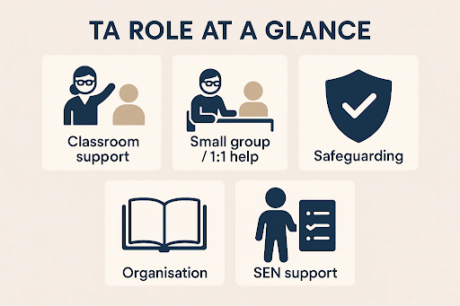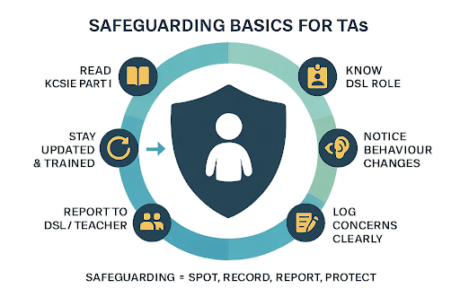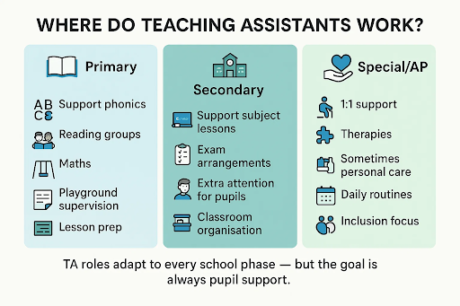“What do teaching assistants do?” is a common question. But first, let’s look at what they really do. Pay makes sense only when you know the job.
Teaching assistants are the extra hands and steady voices in class. TAs support small groups of students and sometimes sit with pupils who need extra help. Each day, they assist with SEND, behaviour, and wellbeing, while also preparing and organising classroom resources. They keep clear records of progress and always follow the safety rules set out in KCSIE.
Now, the money part. In 2025, most new TAs in England start on about £24,400 full-time equivalent, or around £12.65 an hour. Not bad for a role that makes such a big difference every day!
What do teaching assistants do? Core Responsibilities
So, what do teaching assistants do? Let’s break it down in plain words.

- Help the teacher in class: nudge kids along, ask questions, take notes, or show how to do something. That’s real classroom support. They also explain things again if someone doesn’t get it and cheer pupils on to keep them focused.
- Work with small groups or 1:1: check how pupils are doing and pass notes to the teacher. SEN teaching assistants are super important here, helping pupils with reading, writing, or maths. They change tasks so everyone can join in.
- Keep things calm and organised: help with behaviour, routines, and making sure kids feel safe and happy. TAs step in when arguments start or if someone is upset. This is part of safeguarding in schools.
- Get the classroom ready: set up resources, visuals, and tidy up after lessons. They also prep worksheets, organise tables, and make the room welcoming.
Basically, teaching assistant responsibilities cover a bit of everything. They help pupils, support teachers, and make school run smoothly. These are the main TA duties UK schools rely on every day.
Safeguarding Basics

Keeping children safe is a big part of the TA duties in the UK. Here’s what you need to know:
- Know the rules: Read Part 1 of KCSIE so you understand what to do if something worries you. Always tell the DSL (Designated Safeguarding Lead).
- Understand your role: TAs have a special responsibility as part of safeguarding in schools. Follow staff rules so everyone knows what’s okay.
- Watch and listen: notice if a child seems upset, quiet, or not themselves. Little things can be a big clue.
- Write it down: keep notes of anything unusual, even small things. Clear records help teachers and the safeguarding team act quickly.
- Talk to others: safeguarding is a team effort. Chat with teachers, SEN staff, or the DSL if something feels wrong.
- Keep up to date: rules and guidance change, so check for updates to stay on top of TA duties UK and school safety.
In short, safeguarding isn’t just ticking boxes—it’s about spotting problems early, keeping kids safe, and helping them feel supported every day.
How much do Teaching Assistants Earn (2025 Salary Rise)
England, Wales & Northern Ireland (NJC)
From 1 April, pay goes up 3.2%. A starter on SCP2 earns about £24,413 full-time equivalent, roughly £12.65 an hour. Extra allowances, like for SEN support or first aid duties, rise by 3.2% too.
Scotland (COSLA)
Council staff get 4% in 2025/26 and 3.5% in 2026/27. Term-time pay applies here too. These increases help cover living costs and reward extra duties.
TA Pay Made Simple (Term-Time Only & FTE)
Most job ads show full-time equivalent (FTE) pay, but your contract is usually term-time only (TTO). That means your pay is spread over the weeks you actually work, not the whole year. Councils often use a 52.143-week formula to work out hourly rates. This helps you compare different jobs fairly.
Some jobs also give extra money for SEN support, first aid, or helping lead lessons. Knowing how your pay works shows the real value of your teaching assistant salary 2025.
Always check if the pay is FTE or TTO. This way, you know exactly what you’ll get each month.
Benefits & Perks That Add Real Value
First, most TAs get the Local Government Pension Scheme (LGPS). You can pick how much to pay, including a 50/50 option. Over time, it helps you save for the future. Next, councils often give good holiday leave and other perks for wellbeing. This can include extra days off, health programs, or staff support. If you work term-time only, your leave is adjusted to match your school weeks.
Also, TAs get chances for training and growth. Regular CPD sessions help you learn new skills, take on more TA duties in the UK, and move up in your job. Some councils even give extras like travel help, childcare support, or staff discounts. These don’t show in your pay but add real value.
In short, being a TA comes with more than just a salary—it helps with money, skills, and your career.
Where TAs Work (Role Changes by Phase)
What do teaching assistants do? TAs can work in different types of schools, and their role can change depending on the phase.

Primary Schools
In primary schools, you mostly support phonics, reading groups, and maths. You might also supervise playground time or assist with setting up lessons. Basically, you’re there to keep things running smoothly and help kids learn.
Secondary Schools
In secondary schools, you mostly help with different subjects and support lessons. You also help with exam arrangements and give extra attention to students who need it. Your role keeps the class organised and students on track.
Special or AP Schools
In special or AP schools, you mostly work 1:1 with students. You help with therapies and sometimes personal care. You’re really involved in their daily routines and make sure they feel safe and included.
Skills Schools Love
To start with, schools love TAs who stay calm and help with behaviour. You guide students when they get upset and keep the class running smoothly. Being patient and clear makes a big difference every day.
Also, knowing about SEND is important. You should keep simple records and use basic computer skills to track progress and share updates with teachers.
Finally, being a team player matters. You work with teachers, parents, and other staff to help students learn. Joining meetings, sharing ideas, or helping plan lessons shows you’re part of the team.
Entry Routes & Essentials (Quick Overview)
To become a TA, you usually need GCSEs in English and Maths (grades 9–4) or Functional Skills. These give you the basics to help kids with reading, writing, and numbers.
Then, you can do a Level 2 or Level 3 TA course to learn practical skills, like helping in lessons, supporting behaviour, and working with children who have SEND. Another option is a Level 3 apprenticeship, where you learn on the job and get paid at the same time.
You also need an enhanced DBS check to show you’re safe to work with children. Knowing KCSIE rules is important so you can notice and report any worries quickly.
Joining the LGPS pension scheme helps you save for later. Some councils also give extra support, like training, wellbeing perks, and chances to move up to roles like HLTA.
CPD That Gets You Hired Faster
Doing extra training, or CPD, shows schools you’re ready to step in and make a difference. It also gives you a boost of confidence for interviews and can help you move up to roles like HLTA, where you might lead small groups or cover lessons.
Some good courses to try are phonics, autism/ADHD awareness, behaviour support, ELKLAN/communication, and paediatric first aid. They teach skills you actually use every day, help your TA’s CV stand out, and show schools you really care about the kids and the job.
Ready to take the next step? Join the Teaching Assistant course at Unified Course and feel confident, prepared, and proud of your skills.
Progression Paths: HLTA & Beyond
If you want to move up as a TA, becoming an HLTA is a good next step. You can lead small groups, cover lessons for a short time, and help plan activities.HLTAs usually get paid more than regular TAs because they take on extra responsibilities. It’s a nice boost for your CV and your paycheck.
After that, you could move into specialist roles, like working with pupils with SEND, or even train to become a teacher. Learning new skills and taking on more duties can open lots of doors for your career.
What Actually Moves Your Pay Up
- Work more hours or weeks – the more you work, the more money you make. Getting experience also helps you climb the pay scale.
- Step up to HLTA – take on extra duties, like leading groups or covering lessons, to earn more.
- Extra pay perks – working in London or nearby areas, helping SEN pupils, or having first-aid duties can give your pay a boost.
Common Challenges
- TTO vs FTE can confuse you – term-time only pay looks different from full-time pay. Always check so you know what you’ll really earn.
- Pay changes depending on the school – different councils, academies, and sixth-forms can have different pay scales and extra perks.
- Starting pay can feel tight – sometimes entry salaries don’t match living costs. Keep an eye on pensions (LGPS) and ways to move up the pay scale.
FAQs
Where do teaching assistants get paid the most?
- Mostly in London and fringe areas, where extra pay covers higher living costs.
Is it stressful being a teaching assistant?
- It can be busy and challenging, but many TAs enjoy helping kids and seeing their progress.
Can you be a TA with no experience?
- Yes. Some schools hire beginners with basic English, Maths, and enthusiasm, then offer training.
What is the pay scale for a TA in the UK?
- In 2025, starter TAs in England, Wales, and NI earn around £24,400 FTE (~£12.65/h). Scotland has slightly different rates.
What qualifications do you need to be a teaching assistant?
- Usually GCSEs in English & Maths or Functional Skills, plus a Level 2/3 TA course or apprenticeship. An enhanced DBS and knowledge of KCSIE are essential.
What is the minimum TA wage per hour?
- About £12.65 per hour FTE in 2025 for England, Wales, and NI.
Conclusion
Teaching assistants do so much: support teachers, help pupils with SEND, manage behaviour, and keep classrooms running smoothly. These teaching assistant responsibilities make TAs a key part of every school. If you’re wondering how much do teaching assistants earn, it really depends on experience, extra duties, and progression opportunities. Understanding TTO vs FTE pay helps you see the real value of your role.
Beyond pay, TAs enjoy perks like pensions, CPD training, and clear progression paths. With experience and extra courses, you can move up to HLTA, specialist support, or even teacher training. Being a TA is rewarding—you make a real difference every day, and your career can grow alongside your skills.




